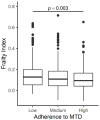Association of Adherence to the Mediterranean-Style Diet with Lower Frailty Index in Older Adults
- PMID: 33808076
- PMCID: PMC8065455
- DOI: 10.3390/nu13041129
Association of Adherence to the Mediterranean-Style Diet with Lower Frailty Index in Older Adults
Abstract
Identifying modifying protective factors to promote healthy aging is of utmost public health importance. The frailty index (FI) reflects the accumulation of health deficits and is one widely used method to assess health trajectories in aging. Adherence to a Mediterranean-type diet (MTD) has been associated with favorable health trajectories. Therefore, this study explored whether adherence to a MTD is negatively associated with FI in the InCHIANTI study. Participants (n = 485) included individuals over 65 years of age at baseline with complete data over a follow-up period of 10 years. MTD was computed on a scale of 0-9 and categorized based on these scores into three groups of low (≤3), medium (4-5), and high (≥6) adherence. Being in a high or medium adherence group was associated with 0.03 and 0.013 unit lower FI scores over the follow-up period, compared to the low adherence group. In participants with a low FI at baseline, being in a high or medium MTD-adherence group had 0.004 and 0.005 unit/year slower progression of FI compared to the low adherence group. These study results support adherence to a MTD as a protective strategy to maintain a lower FI.
Keywords: Mediterranean diet; frailty index; trajectory.
Conflict of interest statement
The authors declare no conflict of interest.
Figures


References
-
- Hoogendijk E.O., Stenholm S., Ferrucci L., Bandinelli S., Inzitari M., Cesari M. Operationalization of a frailty index among older adults in the InCHIANTI study: Predictive ability for all-cause and cardiovascular disease mortality. Aging Clin. Exp. Res. 2020;32:1025–1034. doi: 10.1007/s40520-020-01478-3. - DOI - PMC - PubMed
-
- Brown J.D., Alipour-Haris G., Pahor M., Manini T.M. Association between a Deficit Accumulation Frailty Index and Mobility Outcomes in Older Adults: Secondary Analysis of the Lifestyle Interventions and Independence for Elders (LIFE) Study. J. Clin. Med. 2020;9:3757. doi: 10.3390/jcm9113757. - DOI - PMC - PubMed
MeSH terms
LinkOut - more resources
Full Text Sources
Other Literature Sources

